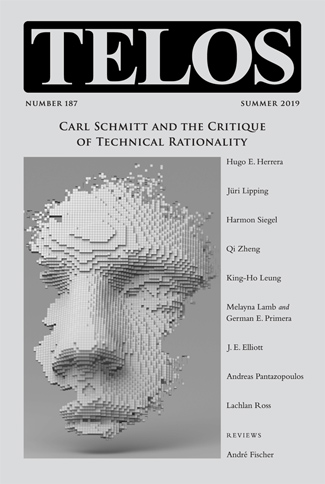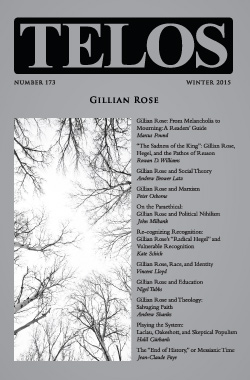In today’s episode of the Telos Press Podcast, David Pan talks with Nir Evron about his article “Hannah Arendt, Thinking, Metaphor,” from Telos 196 (Fall 2021). An excerpt of the article appears here. In their conversation they discussed how Arendt understands the difference between a metaphorical and a literal view of the world; her view of metaphor as a bridge between the thinking ego and the social and political world that it inhabits; the tension in Arendt’s The Life of the Mind between her desire to move beyond metaphysical assumptions and her unwillingness to let go of the philosophical tradition; the consequences for morality of her conception of metaphor; the impact of the Eichmann trial on Arendt and how it prompted her to explore the connection between thoughtlessness and evil; and her belief that the individual’s ability to think in a critical fashion might serve as a check on the descent into totalitarianism. If your university has an online subscription to Telos, you can read the full article at the Telos Online website. For non-subscribers, learn how your university can begin a subscription to Telos at our library recommendation page. Print copies of Telos 196 are available for purchase in our online store.
|
King-Ho Leung’s “Living Paradoxes: On Agamben, Taylor, and Human Subjectivity” appears in Telos 187 (Summer 2019). Read the full article at the Telos Online website, or purchase a print copy of the issue in our online store. Individual subscriptions to Telos are available in both print and online formats. As an occasional feature on TELOSscope, we highlight a past Telos article whose critical insights continue to illuminate our thinking and challenge our assumptions. Today, Jack Robert Edmunds-Coopey looks at Herbert Marcuse’s “Contributions to a Phenomenology of Historical Materialism” from Telos 4 (Fall 1969). Herbert Marcuse’s “Contributions to a Phenomenology of Historical Materialism” (1928) continues his efforts at fusing a contemporary form of Marxism with the work of his doctoral supervisor Martin Heidegger and his phenomenological project in Sein und Zeit (1927). The central tenet that Marcuse uses to construct a thread between Marxism and phenomenology is the analysis of the concrete and the correctness of knowledge as a truth related to this concreteness. The significance of Marxism as a theory of analysis is its self-reflexivity, the means by which it reflects on the process of historicity itself and, in addition to this, the processes of becoming that it undergoes as a result of its historical analysis. The difference here is that phenomenology claims to investigate the essences of things but does not concern itself with its own method or with a dialectical approach between the abstract and concrete, which inevitably occur as one attempts to capture a representation of an object. As an occasional feature on TELOSscope, we highlight a past Telos article whose critical insights continue to illuminate our thinking and challenge our assumptions. Today, Jack Robert Edmunds-Coopey looks at Damien Booth’s “Hegel’s Philosophy of Physics and Kant’s Noumena” from Telos 179 (Summer 2017). Damien Booth’s article “Hegel’s Philosophy of Physics and Kant’s Noumena” addresses Hegel’s critique of Kant concerning the positing of the noumena, the realm beyond the sensible, which for Hegel results in entanglements and contradiction, Kantian antinomies that the dialectic could resolve. While the article appears to be an exposition of the contradiction of Kant’s noumena and its critique in Hegel, Booth turns to Adorno and Heidegger to accentuate the relevance of Kant’s modern project of philosophy and Hegel’s critique. As an occasional feature on TELOSscope, we highlight a past Telos article whose critical insights continue to illuminate our thinking and challenge our assumptions. Today, Erik Pomrenke looks at Andrew J. Mitchell’s “Entering the World of Pain: Heidegger” from Telos 150 (Spring 2010). Heidegger’s thinking of pain allows for a positive revaluation of pain as openness, not closure, to the world. Andrew J. Mitchell contends in his “Entering the World of Pain: Heidegger,” that “pain is the surest sign that we wholly belong to this world; in fact, pain is nothing other than our contact with the world and our ‘openness’ to it.” Mitchell situates Heidegger against two popular accounts of pain: Freudian psychoanalysis and the humanist interpretation of pain as articulated by Elaine Scarry in her book The Body in Pain. Both models oppose pain and openness to the world and therefore see pain as a withdrawal from meaning. Within psychoanalysis, this takes place in the disengagement of cathexis—divestment of libido from love objects. Within the broadly humanist account, world and body are opposed. When the body demands attention, it necessitates a withdrawal from and contraction of the world. Scarry’s thought is structured by such binary oppositions as pain and meaning, interiority and exteriority, and it will be the task of Heidegger’s thinking of pain to reconfigure these oppositions by holding up pain and language as co-original phenomena—a task that Mitchell illustrates by reading Trakl. |
||||
|
Telos Press Publishing · PO Box 811 · Candor, NY 13743 · Phone: 212-228-6479 Privacy Policy · Data Protection Copyright © 2024 Telos Press Publishing · All Rights Reserved |
||||









